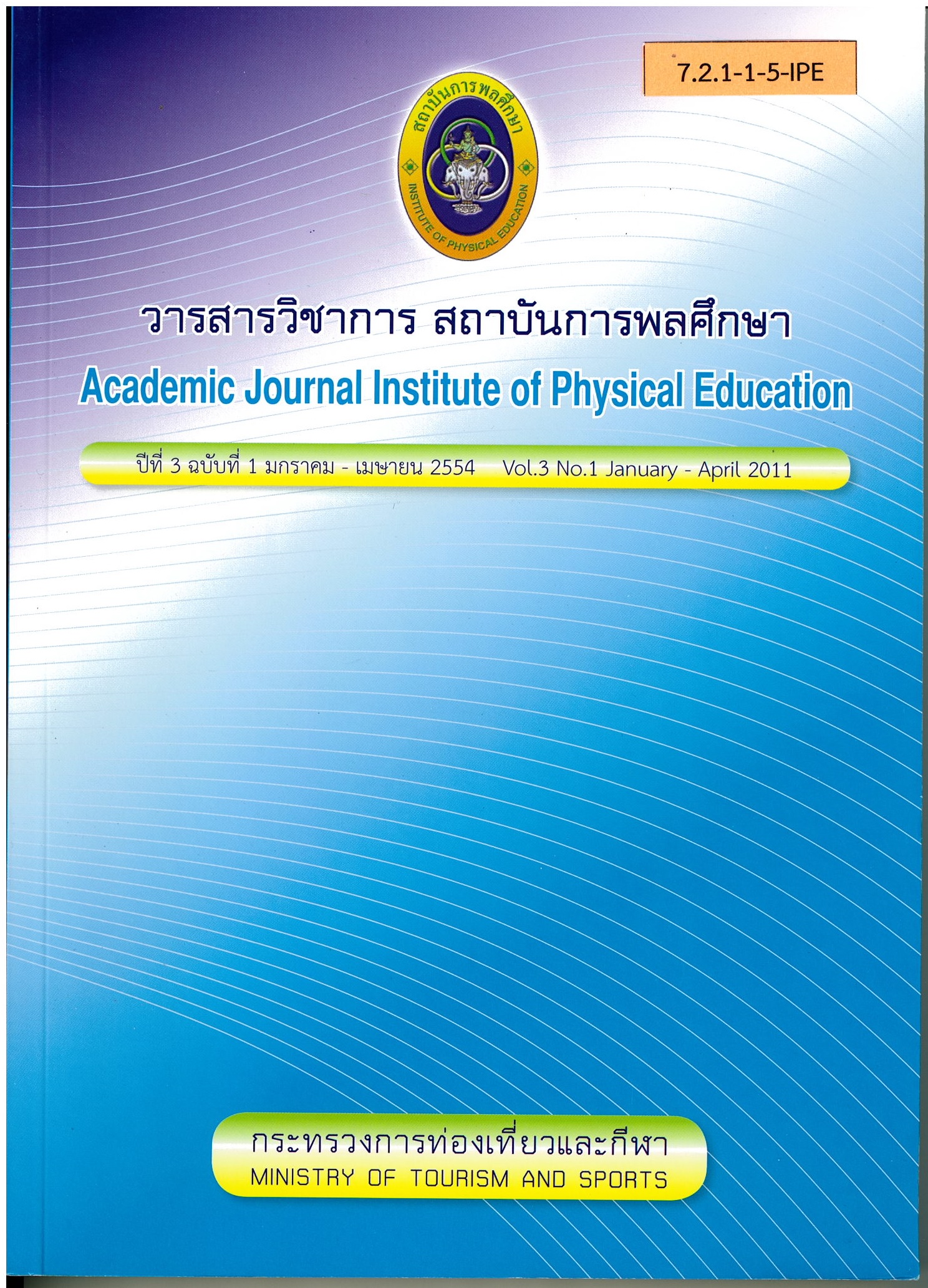The Behavior on The Use of The Internet Which Effects to Social Skills by Students in The Institute of Physical Education
Main Article Content
Abstract
The main purpose of this research was to study the social skills of students in the institute of physical education differences in the use of internet.. The sample was 210 the first year students of the institute of Physical Education during the first semester of academic year 2008.
The research instruments used for gathering data were the internet using behavior and the social skills tests. The two ways ANOVA was used is to analyze the collected data in order to compare social skills of students at the institute of physical education differences in the use of internet.
The result of the study were as follows : There were positive significant relationships between social skill and the average time of using internet per week at point .01 level of significance ; the social skill of students at the institute of physical education with moderate average time of using internet per week was higher than high average time of using internet per week. The social skill of students at the institute of physical education with the purpose of using internet for communication and the purpose of using internet for education were higher than those with a purpose of using internet for entertainment at point .01 level of significance.
Article Details
The published article is a copyright of the Academic Journal of Thailand National Sports University. The passage appeared in each article in this academic journal is a perspective of each author which is not related to the journal. Each author is required to be responsible for all components of his/her own article. If there are any mistakes, each author must be responsible for those mistakes on his/her own.
References
เกศนี ติพพะมงคล. (2545). ความสัมพันธ์ระหว่างพฤติกรรมการใช้อินเตอร์เน็ต การปรับตัวทางสังคมอินเตอร์เน็ตและการปรับตัวทางสังคมของนักเรียนชั้นมัธยมศึกษาตอนปลายในโรงเรียนที่เข้าร่วมโครงการ เครือข่ายคอมพิวเตอร์เพื่อโรงเรียนไทย เขตกรุงเทพมหานคร. ปริญญานิพนธ์การศึกษามหาบัณฑิต สาขาจิตวิทยาพัฒนาการ. กรุงเทพฯ: บัณฑิตวิทยาลัย มหาวิทยาลัยศรีนครินทรวิโรฒ.
“เขาใช้ net กันอย่างไรในสังคมไทย”, (2540, 14 เมษายน), ผู้จัดการ, หน้า 13 – 14.
ดาราวรรณ กล่อมเกลี้ยง. (2546). การสร้างแบบทดสอบวัดทักษะทางสังคมสําหรับนักเรียนชั้น มัธยมศึกษาตอนต้น. ปริญญานิพนธ์การศึกษามหาบัณฑิต สาขาจิตวิทยาพัฒนาการ. กรุงเทพฯ: บัณฑิตวิทยาลัย มหาวิทยาลัยศรีนครินทรวิโรฒ.
นวรัตน์ คุปตานนท์. (2541). การพัฒนามารยาทเครือข่ายของผู้ใช้อินเตอร์เน็ต. วิทยานิพนธ์ สาขาโสตทัศนศึกษา. กรุงเทพฯ : บัณฑิตวิทยาลัย จุฬาลงกรณ์มหาวิทยาลัย.
“ผลกระทบอินเตอร์เน็ตต่อชีวิตสังคม”, (2541, 19 ตุลาคม), เดลินิวส์, หน้า 21.
อําไพศรี โสประทุม. (2539). พฤติกรรมเปิดรับข้อมูลข่าวสารและปัจจัยบางประการที่มีผลต่อการยอมรับการสื่อสารเครือข่ายคอมพิวเตอร์ ระบบอินเตอร์เน็ตของผู้ใช้คอมพิวเตอร์ในเขตกรุงเทพมหานคร. วิทยานิพนธ์สาขาสื่อสารมวลชน. กรุงเทพฯ : บัณฑิตวิทยาลัย มหาวิทยาลัยธรรมศาสตร์.
Harris, M.B, and J.L, Fisher. (1973). Effect of note taking and review on recall. Journal of Education Psychology 65, March, 321 – 325.
R. Kraut et al. (1988). Internet Paradox: A Social Technology that Reduce Social Improvement And Psychological Well-Being," American Psychologist. 53(9). September, 1017 - 1031.
Toby Silverman. (1999). The Internet and Relational Theory," American Psychologist. V 54 (9), 780 - 781.

